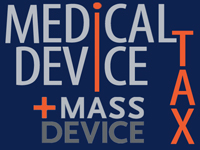
Medical device makers appear to have a new challenge on their hands in facing down the impending 2.3% medical device tax, as a surge of rhetoric from device buyers warns that the levy could turn into a "windfall" for the industry.
"As purchasers of medical devices, hospitals and group purchasing organizations are concerned that medical device companies will eventually pass through this entire tax to their customers," a group of 5 health care associations wrote in a letter to the Internal Revenue Service in response to the agency’s draft proposal for implementation of the device tax. "This strategy would allow device manufacturers to sidestep their responsibilities, while increasing the financial commitment of other stakeholders, including hospitals."
"We also are concerned that the device tax could be implemented in a way that would actually result in a windfall for device companies, and that such an outcome could actually leave these companies in a better financial position than they were before the ACA became law," the hospital groups added. "This is clearly not what Congress intended."
The Medical Imaging & Technology Alliance fired back against the implication, scoffing at the idea that device makers could turn the tax into a triumph.
"Only in Washington could paying a $30 billion tax over the next 10 years be viewed as a windfall opportunity, but that’s exactly the false claim being made," MITA executive director Gail Rodriguez said in prepared remarks. "MITA continues to oppose the device tax precisely because we believe it creates strong headwinds against an important sector of the U.S. economy."
The challengers, which included the Federation of American Hospitals, the American Hospital Assn., the Catholic Health Assn. of the U.S., the Healthcare Supply Chain Assn. and the Assn. for Healthcare Resource & Materials, are not the 1st to bring up such concerns.
Earlier this month, group purchasing organization Premier sent its own letter to the IRS, asking the federal agency to protect hospitals from price hikes by requiring device makers to promise that the tax burden isn’t baked into their prices.
"We believe that Congress did not intend to have hospitals and other providers absorb the device tax," according to Premier’s letter. "To this end, we urge the IRS to prevent device manufacturers from passing the tax on to providers by requiring, at the very least, that manufacturers certify that they have not included the tax in the price of their products on their requisite filing documents."
Premier, in turn, was reiterating similar remarks made by other health care stakeholders last year, who warned that, without proper controls, the tax may turn into a windfall for device makers.
Those concerns were summarily dismissed by MITA’s then-executive director David Fisher last April.
"I can tell you with 100% certainty that nobody in the medical device industry thinks they’re benefiting from the tax," Fisher said. "We were not on Capitol Hill lobbying for it."
MITA restated its position this week, adding that "for companies working to maintain America’s global leadership in the development of innovative medical technologies, the medical device tax poses more challenges for manufactures, job creation and access to innovative diagnostics and therapies," in a statement sent to MassDevice.com.
Repeal efforts seem to be gaining steam recently, as voices for the opposition appear in more news outlets and in more contexts as the levy looms in the near future.
Republican Lamar Alexander (Tenn.) is among the latest to lend his name to Sen. Orrin Hatch’s (R-Utah) Medical Device Access & Innovation Protection Act, which aims to repeal the levy.
"This bill would repeal a tax that will raise premiums for patients and destroy jobs in a fast-growing and life-saving industry – including as many as 1,000 jobs in Tennessee alone," Alexander said in prepared remarks. "Congress needs to repeal the entire health-care law and replace it with reforms that lower the cost of health care, but at the very least it should start with the repeal of this senseless medical device tax that will only make health care more expensive."
The tax, a 2.3% levy on all U.S. sales of medical devices, is part of the Patient Protection & Affordable Care Act. It was originally intended to raise about $20 billion over 10 years, but it’s actually set to raise more than $30.5 billion, a MassDevice.com tax analysis uncovered.

